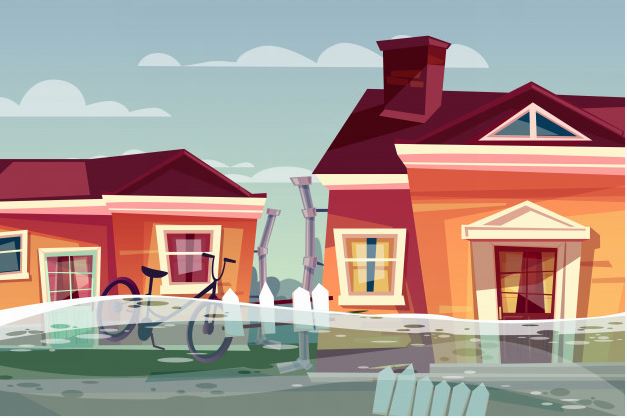
Water damage is a frequent issue. But why is this issue so frequent? They are responsible for water damage. Water damage is exceedingly dangerous, regardless of its source. As a result, safeguarding yourself and your belongings is critical.
Water damage to a property may cause structural damage if it is allowed to fester for a lengthy period of time, which is usual. Here are some tips to help you safeguard your home from water damage.
1) Thoroughly clean all of the gutters
Gutters that are blocked with dead leaves, bird nests, branches, or other debris may struggle to drain water from your roof. You should clean the gutter frequently.
If your gutters are clogged with this matter the water may start to seep in the internal structure which can even harm the foundation of your house.
When performing seasonal cleaning, ensure that all of your gutters are clear and that your downspouts are in the right location. If your gutters are overflowing, take action and/or contact a restoration agency to get them cleaned.
2) Examine the roof’s condition
Regular exposure to the elements, such as temperature changes, thunderstorms, and hurricanes, may cause the roof to fail. You could even see missing shingles from the area. If your shingles are old or cracked, rainwater may enter your home via cracks.
Clear your yard of anything that might go airborne during high winds associated with severe storms to minimize damage to your windows. As a consequence, your windows will be unaffected. Outside, keep grills, picnic tables, and another yard equipment secure.
If you are terrified of heights, have a professional roofer in Cincinnati evaluate your roof. They should be able to detect any problems with your roof that need to be repaired and offer you with an estimate of how long your roof will last and how much it will cost to replace it.
3) The placement of the sealants
The sealants which are placed near the chimneys or windows must be checked frequently. In case the seal is broken or is misplaces then you should replace them. You must repair them timely as any damage caused due to sealants will not be considered under your insurance policy.
Cover the leaks with chalk, tar, and silicone if the sealants are not in place or have been removed in certain spots. Coverings can also be used to keep the elements out of your window wells.
4) Keep an inventory of appliances
We advise you to keep an eye on the condition of your washing machine and refrigerator hoses. You can drastically decrease water damage this way. It lessens the amount of damage done to your property by a flood. To avoid leaks, check and maintain your washing machine and dishwasher on a regular basis, as recommended by the manufacturer.
Examine your air conditioner for leaks and water damage, especially if it has been set on high all summer.
If symptoms of wear are obvious on the hoses, they should be checked and changed at least once a year (cracking, bulging, corrosion). They commonly leak and are one of the most prevalent causes of water loss in houses as they deteriorate and become brittle with age.
5) Do not allow the pipe to freeze
Water, pipelines, and cold do not mix. If your home isn’t heated, your pipes are exposed to the cold, or water is left in exterior water hoses all winter, ice blocks can form, causing substantial pipe damage. Even if you’re going to be gone for an extended period of time, use an intelligent thermostat to keep your home at a minimum temperature of 10 degrees Celsius.
If you will be away from your home for more than four days during the winter, have someone come to your house or empty your water supply lines.
6) Repairing the leaks
If you see any signs of a leak in your home, you should conduct a thorough inspection. On the ceiling, look for any dark spots or exposed pipes. Visible leaky pipes should be repaired as soon as feasible.
A lack of drainage erodes your foundation, resulting in fractures, uneven settling, and water entry points. Look for any missing, loose, or damaged shingles on the roof.
If you overlook moisture issues or put off needed repairs, your house may develop mould, mildew, dry rot, or even structural damage.
A standard homeowners insurance coverage does not cover harm caused by a lack of maintenance. According to this water damage Medford based company, it’s important to repair leaks as soon as possible to prevent structural damage.
You may be interested in: Why roofing needs an expert rather than DIY

